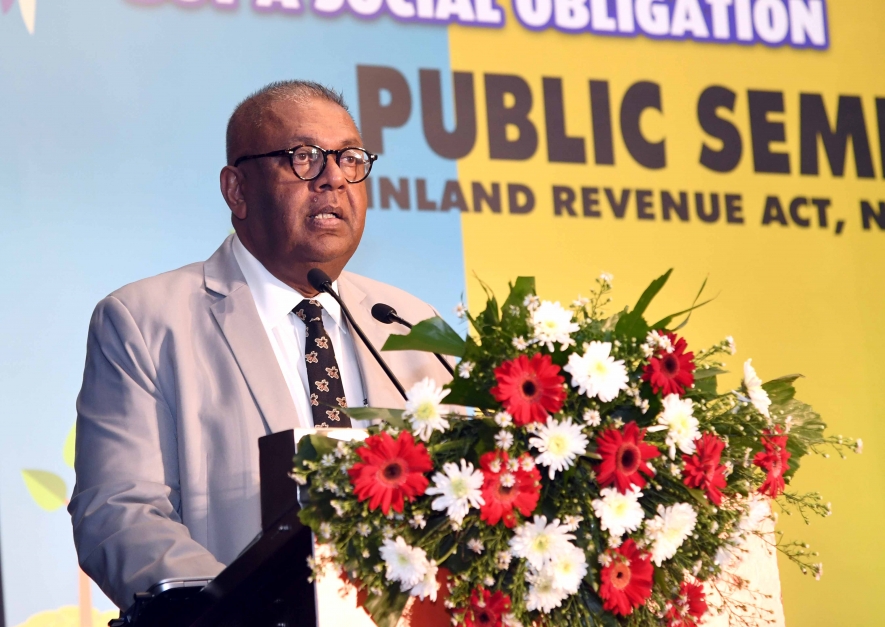I should therefore emphasize that this is a widely endorsed piece of legislation that needs methodical implementation. My contention is that our work will bring a paradigm shift to taxation in this country that in line with our policy of updating complex legislations to achieve our development goals in this 21st Century.
Our current phase of international economic standing as a middle-income country does not allure significant amount of foreign aid and grants. In addition to that, in a precarious international investment and trade environment, developing countries like Sri Lanka must enhance the fiscal income with a view to offset the narrowing external drains. We must optimize utilizing our local resources with a well-managed and efficient tax system as a pro-growth catalyst.
We all must, as citizens, should become partners, stakeholders and masters of our own development endeavours and this new IR Act was designed to broad-base the tax payer understructure and to encourage all of you to shoulder that collective responsibility.
Over two decades Sri Lanka recorded a downward tax revenue that reached just over 10% in 2014 as a share of the GDP. Sri Lanka was among the lowest tax revenue countries. Despite the continued rise in income levels, our tax revenue failed to record any improvements. Some experts opined that on one hand our tax system was complex and confusing, on the other hand there were numerous ad-hoc tax concessions, over 200 of them, which were granted without any rationale.
The elimination of tax exemptions through this new Act would create a level playing field for everyone to do business, moving away from the culture of preferential treatments. In fact, as you would recall, my pledge for the country in 2018 Budget was ‘Enterprise Sri Lanka’. Our Government has shown steadfast commitment towards making an investor-friendly environment by carrying out necessary improvements in doing-business and providing infrastructure and other facilities. Every citizen who wishes to be an entrepreneur will have an environment of transparency, fairness and equity in future Sri Lanka once our new rules-based legal system in operation.
This new legislation carves a clear strategic direction about taxation in the country. We expect to increase the share of direct income tax against indirect taxes. The preferred ratio is 40% to 60% from the current level of 18% to 82%. That is one of the hallmarks of a fairer tax system. Yet, we are fully cognisant that this is an enormously challenging goal. The new Inland Revenue Act is a timely step in that direction. I hope we will have a smooth transition and a better system with the passage of time.
Along with that broader strategic direction, we are setting the platform and working continuously on promoting the business climate by enhancing taxpayers’ protections and providing greater certainty on tax affairs. Also, we are aiming at improving tax compliance by strengthening administrative powers of the Inland Revenue Department to supplement the technological advancements that are being implemented.
Your tax payments drive country’s future. Your money goes into expenditure on education, health, infrastructure, environment protection, law and order, and welfare improvements, among others. As you would appreciate, our Government implements an array of subsidies and transfers for low income groups.
It will continue to provide relief in the event of unforeseen events such as natural disasters. As tax payers, you all responsibly contribute towards a noble objective of bettering and enhancing the welfare of the society. And on a more fundamental basis, we are aiming at lessening imbalances in income and wealth creation in the country as we progress towards an upper-middle income country.
Yet, there are many areas to improve. Our tax compliance is one of the weakest in the region. The number of individuals and firms registered for paying taxes remains at a surprisingly low level. These numbers are very hard to be corroborated with the realities given the profile of corporate sector in the country and our labour market dynamics.
Ladies and Gentlemen,
Thus, let me conclude by saying this. Since independence, our income tax share of the total tax revenue has remained flat and hardly crossed a threshold of 20 percent. It is rather ironic that our relative share of direct tax income remained low. As countries grow, income tax share ought to grow. Yet raising one percentage point in the direct tax revenue involves hard work. It warrants support from many corners and meticulous coordination. With the enthusiasm of all my staff and the due cooperation from you, I am hopeful that we will make new strides there. Public seminars like these would prove it clearly.
I wish this public awareness event a great success. Thank you.
































































































































































